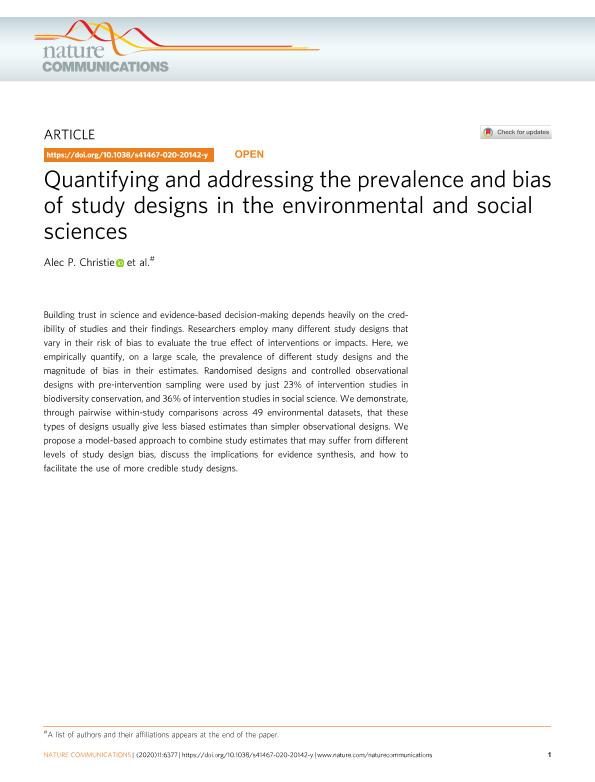Artículo
Quantifying and addressing the prevalence and bias of study designs in the environmental and social sciences
Christie, Alec P.; Abecasis, David; Adjeroud, Mehdi; Alonso, Juan Carlos; Amano, Tatsuya; Anton, Alvaro; Baldigo, Barry P.; Barrientos, Rafael; Bicknell, Jake E.; Buhl, Deborah A.; Cebrian, Just; Ceia, Ricardo S.; Cibils Martina, Luciana ; Clarke, Sarah; Claudet, Joachim; Craig, Michael D.; Davoult, Dominique; De Backer, Annelies; Donovan, Mary K.; Eddy, Tyler D.; França, Filipe M.; Gardner, Jonathan P. A.; Harris, Bradley P.; Huusko, Ari; Jones, Ian L.; Kelaher, Brendan P.; Kotiaho, Janne S.; López Baucells, Adrià; Major, Heather L.; Mäki Petäys, Aki
; Clarke, Sarah; Claudet, Joachim; Craig, Michael D.; Davoult, Dominique; De Backer, Annelies; Donovan, Mary K.; Eddy, Tyler D.; França, Filipe M.; Gardner, Jonathan P. A.; Harris, Bradley P.; Huusko, Ari; Jones, Ian L.; Kelaher, Brendan P.; Kotiaho, Janne S.; López Baucells, Adrià; Major, Heather L.; Mäki Petäys, Aki
 ; Clarke, Sarah; Claudet, Joachim; Craig, Michael D.; Davoult, Dominique; De Backer, Annelies; Donovan, Mary K.; Eddy, Tyler D.; França, Filipe M.; Gardner, Jonathan P. A.; Harris, Bradley P.; Huusko, Ari; Jones, Ian L.; Kelaher, Brendan P.; Kotiaho, Janne S.; López Baucells, Adrià; Major, Heather L.; Mäki Petäys, Aki
; Clarke, Sarah; Claudet, Joachim; Craig, Michael D.; Davoult, Dominique; De Backer, Annelies; Donovan, Mary K.; Eddy, Tyler D.; França, Filipe M.; Gardner, Jonathan P. A.; Harris, Bradley P.; Huusko, Ari; Jones, Ian L.; Kelaher, Brendan P.; Kotiaho, Janne S.; López Baucells, Adrià; Major, Heather L.; Mäki Petäys, Aki
Fecha de publicación:
11/12/2020
Editorial:
Springer
Revista:
Nature Communications
ISSN:
2041-1723
Idioma:
Inglés
Tipo de recurso:
Artículo publicado
Clasificación temática:
Resumen
Building trust in science and evidence-based decision-making depends heavily on the credibility of studies and their findings. Researchers employ many different study designs that vary in their risk of bias to evaluate the true effect of interventions or impacts. Here, we empirically quantify, on a large scale, the prevalence of different study designs and the magnitude of bias in their estimates. Randomised designs and controlled observational designs with pre-intervention sampling were used by just 23% of intervention studies in biodiversity conservation, and 36% of intervention studies in social science. We demonstrate, through pairwise within-study comparisons across 49 environmental datasets, that these types of designs usually give less biased estimates than simpler observational designs. We propose a model-based approach to combine study estimates that may suffer from different levels of study design bias, discuss the implications for evidence synthesis, and how to facilitate the use of more credible study designs.
Palabras clave:
ECOLOGY
,
ENVIRONMENTAL IMPACT
,
SCIENTIFIC COMMUNITY
,
SOCIAL SCIENCES
Archivos asociados
Licencia
Identificadores
Colecciones
Articulos(CCT - CORDOBA)
Articulos de CTRO.CIENTIFICO TECNOL.CONICET - CORDOBA
Articulos de CTRO.CIENTIFICO TECNOL.CONICET - CORDOBA
Citación
Christie, Alec P.; Abecasis, David; Adjeroud, Mehdi; Alonso, Juan Carlos; Amano, Tatsuya; et al.; Quantifying and addressing the prevalence and bias of study designs in the environmental and social sciences; Springer; Nature Communications; 11; 1; 11-12-2020; 1-11
Compartir
Altmétricas



